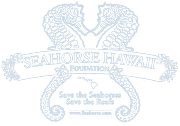Ocean Rider Seahorse Farm and Tours | Kona Hawaii › Forums › Seahorse Life and Care › Egga a float › Re:Egga a float
Dear hold your horses:
Yes, it is not at all uncommon for an inexperienced pair of seahorses to spill some or all of the eggs during their initial attempt to mate. As you have seen, Hippocampus erectus ova are bright orange ovoids about 1.5 mm in diameter. Unlike most fish eggs, which are round or nearly so, seahorse eggs are pear-shaped. They are full of oil droplets and rich in carotenoids (yellow to red pigments), which help to provide an intracellular source of oxygen for the fetal fry. The presence of these pigments gives the eggs their characteristic orange coloration. The eggs are negatively buoyant and sink to the bottom when released but they are sticky to the touch initially and may therefore cling to seagrass or the branches of a hitching post. They must have been recently released if they are all still in the form of a sticky string.
So it sounds like your seahorses are actively interested in breeding, but that they botched the egg transfer. That’s not unusual with inexperienced pairs that often find coitus awkward and difficult to accomplish successfully.
In order to ensure fertilization, the female must add water to her mature oocytes (egg cells) just prior to mating. A ripe female is committed to mating once she has hydrated her clutch of eggs. She cannot retain the hydrated eggs indefinitely. They can only be retained for approximately 24 hours, before they must be released. She must transfer these eggs to a receptive male within 24 hours of hydration, or lose the entire clutch. Should she be unable to transfer them to a receptive male within that time, she risks becoming egg bound, and her only recourse is to release them into the water column, spilling her eggs onto the substrate.
The actual transfer of eggs takes place at the apex of the copulatory rise while the couple is suspended in midwater or slowly descending toward the bottom — a maneuver that is every bit as tricky as it sounds. Coitus is marked by an extremely awkward, fleeting embrace, aptly described as little more than a brief belly-to-belly bumping.
As you can imagine, many difficult and delicate maneuvers are required to bring the pair into proper position for this most improbable merging, and inexperienced pairs often struggle to get it right. The female will attempt to insert her oviduct into the gaping aperture of the male’s inflated brood pouch. An inexperienced pair will often end up misaligned, perhaps at right angles to one another or with one of the partners too high or too low to join. This is very typical of the many false starts and abortive attempts that are ordinarily involved. The frustrated couple may even separate to rest on the bottom briefly between mating attempts. They may require many such rises before the proper positioning is achieved and the crucial connection is finally made.
So under certain circumstances, it’s not at all unusual for eggs to be spilled while mating or even for a female to drop her entire clutch of eggs, if necessary. As long as your tank is tall enough to allow your seahorses to mate comfortably, you shouldn’t be at all concerned at discovering some dropped eggs. Practice makes perfect, and sooner or later your pair will get it right and begin producing broods with clocklike regularity.
Because males inflate their brood pouches with water to the bursting point during courtship displays aptly known as "Pumping" and "Ballooning," it’s easy to mistake the distended pouch of a courting male for a pouch full of fetal fry and developing embryos. One rule of thumb that can help avoid such confusion is that when a stallion’s pouch remains swollen and distended for more than three days in a row, then and only then is it safe to assume that you’re dealing with a gravid male and a genuine pregnancy, rather than an amorous male performing pouch displays. In the meantime, don’t get too excited about a breeding male with a puffed up pouch, because he may simply be inflating his pouch with water in an attempt to impress the eligible females.
At any rate, the spilled eggs are a sure sign that one or more of your stallions is trying hard to get pregnant and that at least one of the females is receptive and doing her best to oblige him, so if your male is not actually pregnant at the moment, chances are good that he will be before too long. However, a female that has dropped her clutch of eggs normally won’t hydrate more eggs and attempt to mate again until the next breeding cycle, so your pair may have to wait a few more weeks before they try again.
Best of luck with your seahorses, holdyourhorses! Your seahorses are certainly displaying a healthy interest in courtship and mating, so the chances are excellent that they will present you with more offspring before long.
Happy Trails!
Pete Giwojna




